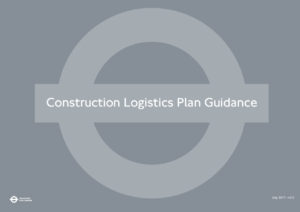Construction works have environmental, safety and congestion impacts on the road network. It will also have impacts on the surrounding community. The impacts can vary depending on the size, timescale and location of the development and, for larger developments that may take many years to construct, the construction phase can have a greater impact than the operational phase.
Construction Logistics Plan
A Construction Logistics Plan (CLP) is an important management tool for planners, developers and construction contractors. The CLP focuses specifically on construction supply chains and how their impact on the road network can be reduced. The construction supply chain covers all movements of goods, waste and servicing activity to and from site.
Good practice in London
Transport for London (TfL) is concerned with assessing the most appropriate methods of freight movement in London and ensuring a distribution network which minimises congestion, ensures the safe passage of goods and mitigates its environmental impact. Development proposals should aim to reduce levels of road freight, particularly during peak periods and make use of sustainable modes where possible – rail and water for larger consignments and cycling and walking for local activity.
Transport for London (TfL) published a CLP Guidance that will help to ensure that requirements are met and that planning applications can be reviewed and assessed comprehensively. The guidance is designed to integrate with all activity undertaken throughout the planning process and construction programme.
A CLP provides the framework for understanding and managing construction vehicle activity into and out of a proposed development. A full assessment of all phases of construction should be included and detail:
- The amount of construction traffic generated
- The routes the construction vehicles will use and consideration of local impacts
- The impact on relevant Community Considerations
- Any traffic management that will be in place.
The CLP Guidance can be downloaded here.

